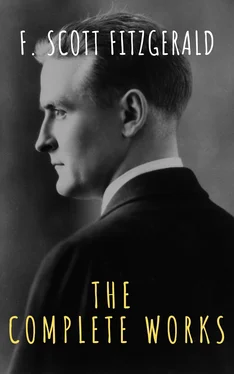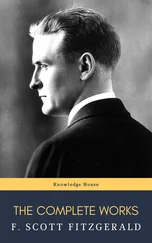Array The griffin classics - The Complete Works of F. Scott Fitzgerald
Здесь есть возможность читать онлайн «Array The griffin classics - The Complete Works of F. Scott Fitzgerald» — ознакомительный отрывок электронной книги совершенно бесплатно, а после прочтения отрывка купить полную версию. В некоторых случаях можно слушать аудио, скачать через торрент в формате fb2 и присутствует краткое содержание. Жанр: unrecognised, на английском языке. Описание произведения, (предисловие) а так же отзывы посетителей доступны на портале библиотеки ЛибКат.
- Название:The Complete Works of F. Scott Fitzgerald
- Автор:
- Жанр:
- Год:неизвестен
- ISBN:нет данных
- Рейтинг книги:5 / 5. Голосов: 1
-
Избранное:Добавить в избранное
- Отзывы:
-
Ваша оценка:
- 100
- 1
- 2
- 3
- 4
- 5
The Complete Works of F. Scott Fitzgerald: краткое содержание, описание и аннотация
Предлагаем к чтению аннотацию, описание, краткое содержание или предисловие (зависит от того, что написал сам автор книги «The Complete Works of F. Scott Fitzgerald»). Если вы не нашли необходимую информацию о книге — напишите в комментариях, мы постараемся отыскать её.
The first table of contents (at the very beginning of the ebook) lists the titles of all novels included in this volume. By clicking on one of those titles you will be redirected to the beginning of that work, where you'll find a new TOC that lists all the chapters and sub-chapters of that specific work.
The Complete Works of F. Scott Fitzgerald — читать онлайн ознакомительный отрывок
Ниже представлен текст книги, разбитый по страницам. Система сохранения места последней прочитанной страницы, позволяет с удобством читать онлайн бесплатно книгу «The Complete Works of F. Scott Fitzgerald», без необходимости каждый раз заново искать на чём Вы остановились. Поставьте закладку, и сможете в любой момент перейти на страницу, на которой закончили чтение.
Интервал:
Закладка:
I watched him intently while my hall boy whispered to him, and he walked slowly and consciously over to me to shake hands gravely and escort me to a small table. For an hour we talked of family things, of healths and deaths and births. I could not take my eyes off him. The blood-shot streakedness of his green eyes made me think of weird color combinations in a child’s paint-box. He had been looking bored for about ten minutes, and my talk had been dwindling despondently down, when suddenly he waved his hand as if to brush away a veil, and began to question me.
“Is that damn father of yours still defending me against your mother’s tongue?”
I started, but, strangely, felt no resentment.
“Because,” he went on, “it’s the only thing he ever did for me all his life. He’s a terrible prig. I’d think it would drive you wild to have him in the house.”
“Father feels very kindly toward you, sir,” I said rather stiffly.
“Don’t,” he protested smiling. “Stick to veracity in your own family and don’t bother to lie to me. I’m a totally black figure in your mind, I’m well aware. Am I not?”
“Well—you’ve—you’ve had a twenty years’ history.”
“Twenty years—hell—” said Uncle George. “Three years’ history and fifteen years’ aftermath.”
“But your books—and all.”
“Just aftermath, nothing but aftermath. My life stopped at twenty-one one night in October at sixteen minutes after ten. Do you want to hear about it? First I’ll show you the heifer and then I’ll take you upstairs and present you to the altar.”
“I, you—if you—” I demurred feebly, for I was on fire to hear the story.
“Oh,—no trouble. I’ve done the story several times in books and life and around many a littered table. I have no delicacy anymore—I lost that in the first smoke. This is the totally blackened heifer whom you’re talking to now.”
So he told me the story.
“You see it began sophomore year—began most directly and most vividly in Christmas vacation of sophomore year. Before that she’d always gone with a younger crowd—set, you young people call it now,”—he paused and clutched with mental fingers for tangible figures to express himself. “Her dancing, I guess, and beauty and the most direct, unprincipled personality I’ve ever come in contact with. When she wanted a boy there was no preliminary scouting among other girls for information, no sending out of tentative approaches meant to be retailed to him. There was the most direct attack by every faculty and gift that she possessed. She had no divergence of method—she just made you conscious to the highest degree that she was a girl”—he turned his eyes on me suddenly and asked:
“Is that enough—do you want a description of her eyes and hair and what she said?”
“No,” I answered, “go on.”
“Well, I went back to college an idealist. I built up a system of psychology in which dark ladies with alto voices and infinite possibilities floated through my days and nights. Of course we had the most frantic correspondence—each wrote ridiculous letters and sent ridiculous telegrams, told all our acquaintances about our flaming affair and—well you’ve been to college. All this is banal, I know. Here’s an odd thing. All the time I was idealizing her to the last possibility, I was perfectly conscious that she was about the faultiest girl I’d ever met. She was selfish, conceited and uncontrolled and since these were my own faults I was doubly aware of them. Yet I never wanted to change her. Each fault was knit up with a sort of passionate energy that transcended it. Her selfishness made her play the game harder, her lack of control put me rather in awe of her, and her conceit was punctuated by such delicious moments of remorse and self-denunciation that it was almost—almost dear to me—Isn’t this getting ridiculous? She had the strongest effect on me. She made me want to do something for her, to get something to show her. Every honor in college took on the semblance of a presentable trophy.”
He beckoned to a waiter to my infinite misgiving, for though he seemed rather more sober than when I had arrived, he had been drinking steadily, and I knew my own position would be embarrassing if he became altogether drunk.
“Then”—between sips—“we saw each other at sporadic intervals, quarreled, kissed and quarreled again. We were equals; neither was the leader. She was as interested in me as I was fascinated by her. We were both terrifically jealous, but there was little occasion to show it. Each of us had small affairs on the side but merely as relaxations when the other was away. I didn’t realize it but my idealism was slowly waning—or increasing into love—and rather a gentle sort of love.” His face tightened. “This isn’t cup sentiment.” I nodded and he went on: “Well, we broke off in two hours, and I was the weak one.”
“Senior year I went to her school dance in New York, and there was a man there from another college of whom I became very jealous and not without cause. She and I had a few words about it, and half an hour later I walked out on the street in my coat and hat, leaving behind the melancholy statement that I was through for good. So far so good. If I’d gone back to college that night or if I’d gone and gotten drunk or done almost anything wild or resentful, the break would never have occurred—she’d have written next day. Here’s what did happen. I walked along Fifth Avenue letting my imagination play on my sorrow, really luxuriating in it. She’d never looked better than she had that night, never; and I had never been so much in love. I worked myself up to the highest pitch of emotional imagination and moods grew real on me and then—Oh poor damn fool that I was—am—will always be—I went back. Went back! Couldn’t I have known or seen—I knew her and myself—I could have plotted out for anyone else or, in a cool mood, for myself just what I should have done, but my imagination made me go back, drove me. Half a thought in my brain would have sent me to Williamstown or the Manhattan bar. Another half thought sent me back to her school. When I crossed the threshold it was sixteen minutes after ten. At that minute I stopped living.”
“You can imagine the rest. She was angry at me for leaving, hadn’t had time to brood, and when she saw me come in she resolved to punish me. I swallowed it hook and bait and temporarily lost confidence, temper, poise, every single jot of individuality or attractiveness I had. I wandered around that ballroom like a wild man trying to get a word with her, and when I did I finished the job. I begged, pled, almost wept. She had no use for me from that hour. At two o’clock I walked out of that school a beaten man.”
“Why the rest—it’s a long nightmare—letters with all the nerve gone out of them, wild imploring letters; long silences hoping she’d care; rumors of her other affairs. At first I used to be sad when people still linked me up with her, asked me for news of her, but finally when it got around that she’d thrown me over people didn’t ask me about her anymore, they told me of her—crumbs to a dog. I wasn’t the authority anymore on my own work, for that’s what she was—just what I’d read into her and brought out in her. That’s the story—” He broke off suddenly and rose; tottering to his feet, his voice rose and rang through the deserted grill.
“I read history with a new viewpoint since I had known Cleopatra and Messalina and Montespan,”—he started toward the door.
“Where are you going?” I asked in alarm.
“We’re going upstairs to meet the lady. She’s a widow now for awhile, so you must say Mrs.—see—Mrs.”
We went upstairs, I carefully behind with hands ready to be outstretched should he fall. I felt particularly unhappy. The hardest man in the world to handle is one who is too sober to be vacillating and too drunk to be persuaded; and I had, strange to say, an idea that my uncle was eminently a person to be followed.
Читать дальшеИнтервал:
Закладка:
Похожие книги на «The Complete Works of F. Scott Fitzgerald»
Представляем Вашему вниманию похожие книги на «The Complete Works of F. Scott Fitzgerald» списком для выбора. Мы отобрали схожую по названию и смыслу литературу в надежде предоставить читателям больше вариантов отыскать новые, интересные, ещё непрочитанные произведения.
Обсуждение, отзывы о книге «The Complete Works of F. Scott Fitzgerald» и просто собственные мнения читателей. Оставьте ваши комментарии, напишите, что Вы думаете о произведении, его смысле или главных героях. Укажите что конкретно понравилось, а что нет, и почему Вы так считаете.












